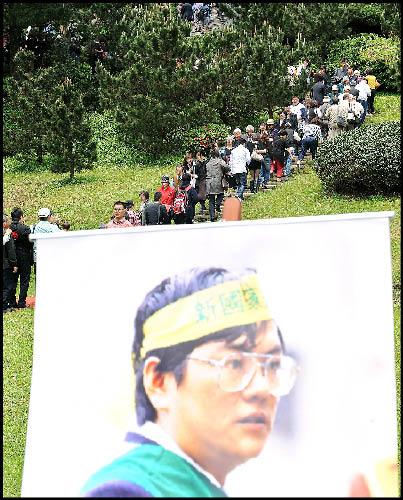|
DPP reaffirms support
for late activist
FIERY END: Deng Nan-jung set himself on fire
rather than surrender as police tried to arrest him on sedition charges for
authoring a ‘Republic of Taiwan constitution’
By Vincent Y. Chao / Staff Reporter

Attendees at a memorial ceremony
marking the 22nd anniversary of the death of independence -advocate Deng Nan-jung,
organized by the Deng Liberty Foundation, move up and down the steps to Deng’s
tomb in New Taipei City’s Jinbaoshan Cemetery yesterday.
Photo: Chu Pei-hsiung, Taipei Times
Democratic Progressive Party (DPP)
politicians reaffirmed their support for Deng Nan-jung’s (鄭南榕) struggle
yesterday, praising the late independence advocate for his contributions to
Taiwan’s freedom and democracy.
“He was a selfless hero that taught us to fearlessly seek the truth and bravely
defend our beliefs,” DPP presidential hopeful Tsai Ing-wen (蔡英文) said at a
-memorial ceremony marking the 22nd anniversary of his death.
“Only through [these] sacrifices could Taiwan have the hard-won democratic
freedoms we see today,” Tsai said.
Tsai, the only leader of the DPP that didn’t participate in Taiwan’s democracy
movement during the 1970s and 1980s, said the party would “reflect on the past
and remember the lessons learned.”
“Taiwanese paid the price with lives, blood and tears in the pursuit of freedom,
democracy and human rights during the one-party system,” she said. “We won’t
forget [their sacrifices].”
The remarks come 22 years after the political writer set himself on fire during
an arrest by police on charges of sedition for his work on a new Taiwanese
constitution.
Among the nearly 100 people present at the memorial were former premier Frank
Hsieh (謝長廷) and other senior DPP officials. Family members, a pastor and artists
were also present at the ceremony.
“Deng Nan-jung gave his life for Taiwan. The values of freedom, human rights and
democracy are not God-given,” said Hsu Chang-hsien (許章賢), a director at the Deng
Liberty Foundation. “Taiwanese must continue to defend these ideals.”
Born in Taiwan in 1947 to a family from China, Deng publicly articulated support
for Taiwanese independence on numerous occasions in the 1980s at the same time
that a charge of sedition was used against proponents of independence.
A follower of liberalism, Deng held a deep belief in freedom of expression and
established Freedom Era Weekly in 1984 in pursuit of what he called “100 percent
freedom of expression.”
In 1987, Deng made a widely heard statement when delivering a speech at a rally
in Taipei: “My name is Deng Nan-jung, I support independence for Taiwan.”
The statement could have gotten him into trouble because the issue of
independence was taboo under Martial Law. However, Deng insisted on openly
declaring his political ideology because he believed that freedom of expression
was a fundamental right for all people.
In 1988, he published a draft “Republic of Taiwan constitution.”
On April 7, 1989, he set himself alight as heavily armed police attempted to
break into his office following 71 days of self-imposed isolation after he was
charged with sedition for the anti-government stance of his magazine after it
published the draft constitution.
Yeh Chu-lan (葉菊蘭), Deng’s widow and former deputy premier, has said that the
reason she had been involved in politics for the past 20 years following her
husband’s death was motivated by the hope that the next generation of Taiwanese
could live free from fear.
Additional reporting by staff writer
|
![]()
![]()
![]()